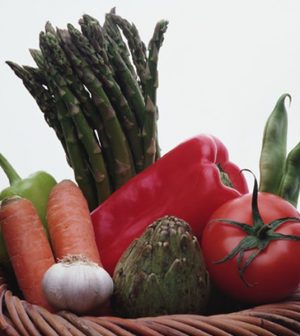- Could Your Grocery Store Meat Be Causing Recurring UTIs?
- Are You Making This Expensive Thermostat Error This Winter?
- Recognizing the Signs of Hypothyroidism
- 10 Strategies to Overcome Insomnia
- Could Artificial Sweeteners Be Aging the Brain Faster?
- Techniques for Soothing Your Nervous System
- Does the Water in Your House Smell Funny? Here’s Why
- Can a Daily Dose of Apple Cider Vinegar Actually Aid Weight Loss?
- 6 Health Beverages That Can Actually Spike Your Blood Sugar
- Treatment Options for Social Anxiety Disorder
Keep Eating Veggies (and Fruits) for Better Health

Your parents’ advice to eat your vegetables has solid science behind it.
Filling half your plate with non-starchy selections, as well as some fruit, provides a high volume of low-calorie food that can tame hunger as it delivers important nutrients.
A study done at Cleveland’s Case Western Reserve University School of Medicine provides more good news — the higher the ratio of vegetables and fruits to other foods you eat, the better you’re able to ward off heart disease and metabolic disease, a risk factor for diabetes.
To get the widest range of nutrients, experts say to pick a rainbow — a mix of vegetables and fruits in every color. If you have to narrow down choices, put dark green and yellow-orange vegetables at the top of the list.
That means choices like sweet potatoes, carrots and squash along with leafy greens, broccoli and Brussels sprouts. Citrus fruits and various berries are great fruit choices.
If you’re on a tight budget, look for veggies that deliver the most nutrients dollar-for-dollar, according to a report in the Journal of the Academy of Nutrition and Dietetics.
Based on data from the U.S. Department of Agriculture, the researchers identified the most nutrient-dense vegetables, offering essentials like fiber; vitamins A, C and E; and the minerals calcium, iron, magnesium and potassium.
The results showed that tomato juices and tomato soups; dark green leafy and non-leafy vegetables, especially broccoli; and deep yellow vegetables like sweet potatoes had the highest scores overall.
More information
To learn more about vegetable and fruit nutrition, visit the American Academy of Family Physicians.
Source: HealthDay
Copyright © 2026 HealthDay. All rights reserved.










